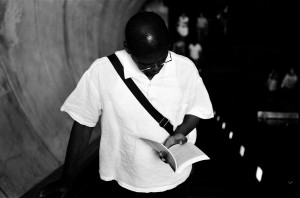lost poets and found poetry in washington, d.c.

(Photo Credit: Thomas Sayers Ellis)
I’m good at getting lost. A few years ago, living in a French town so small even its residents had barely heard of it, I lost my way at least once a week. I was also known to lose the bakery, the drugstore, the school where I was teaching, and my colleagues at that school. Streets rayed out from the town center like the arms of a starfish--a crippled starfish whose limbs twisted and gnarled.
Walking in Washington, D.C.—the site of the Poetry Foundation’s new online tour—several weeks ago, I found myself transfixed by street names. Not because I was lost, though I was, but because those names follow particular patterns. First they run from A through Z (A Street, B Street, etc.). Then they run A-Z again, but with bisyllabic words (Euclid, Fairmont, Girard, Harvard). Then they run A-Z yet again, but with trisyllabic words (Allison, Buchanan, Crittenden, Decatur). Any street might change names farther west or east — but the changed name must obey the same rules determining the original one (so Allison turns into Albemarle, both trisyllabic words starting with “A”).
Whoever named D.C. streets attended to rules familiar to poets: syllable count, word order, alliteration. They wrote their city in a series of syllabic acrostics. Walking through Washington is like moving through a formal poem; like verse forms, the patterns prevent you from getting lost. Unless you’re me.
It’s hard not to feel a swell of grandeur, even if you’re lost, as you stroll those streets, pondering the history of acrostics: the important Hebrew prayer Ashrei comes to mind, as does the book of Jeremiah. More recent contributions include Lewis Carroll’s “A Boat Beneath a Sunny Sky,” which spells out the name of Alice Pleasance Liddell, and Robert Pinsky’s “ABC,” and Billy Collins’s “The Names.”
What I like particularly about D.C.’s acrostics is their flexibility: names change and multiply, yet only within bounds. If cities stood for poetic movements, D.C. would stand for an adaptive formalism. And my French village would argue—with the Frenchman’s passion for freedom—for vers libre, though after a time its confusions revealed their own patterns: the flustered request for directions, the questions as to where one was from, the amusement as to how one had managed to lose oneself, the Au revoir, mademoiselle! ringing out like a refrain.
Abigail Deutsch, the winner of Poetry magazine's 2010 Editors Prize for Reviewing, lives in New York...
Read Full Biography

